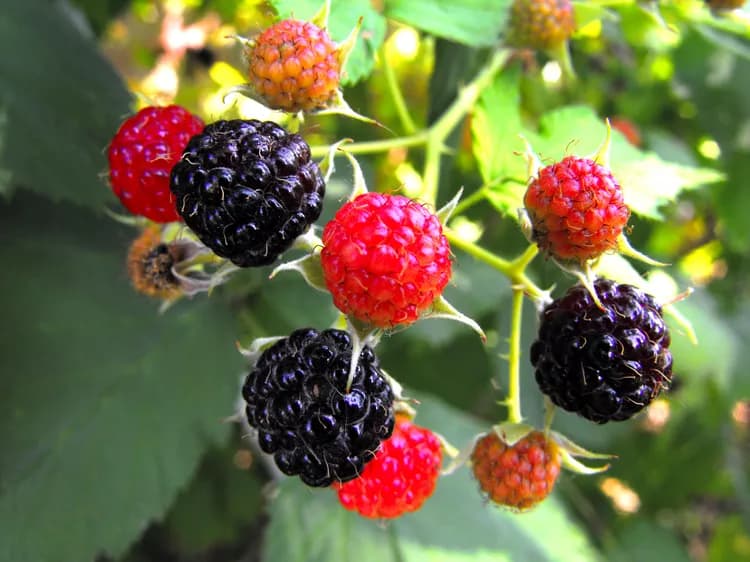The raspberry is an edible fruit belonging to the rose family. The vibrant red raspberry is an important commercial fruit crop that is widely grown in temperate regions of the world. Other types, like the black raspberry, are occasionally grown in the United States. A single raspberry comprises of around 100 drupelets, each containing a ripe pulp and a single central seed. The following include several of the health benefits of raspberries.
Raspberries are a wonderful snack to munch on because they are low in calories with high amounts of fiber. The fiber content in raspberries will improve digestive health and alleviate constipation. The daily requirement of fiber per day is 25 grams (minimum), and one cup of raspberries contains 8 grams of dietary fiber. This helps the body drive out biological wastes, while maintaining healthy blood sugar levels.
Raspberries also have a lower glycemic index value than other foods because of their high fiber content. The glycemic index (GI) scores food and drinks based on the potential blood sugar increase that the food and drinks can induce. It is beneficial to eat foods low on the glycemic index, as these foods are less likely to cause blood sugar spikes. Foods high on the glycemic index (such as white rice and white bread) will break down easily and potentially be dangerous to those suffering from diabetes. The sugars from raspberries are slowly absorbed into the bloodstream, which prevents sugar crashes, sugar cravings, and mood swings.
For individuals with high blood pressure, raspberries can help sustain a healthy blood pressure. Raspberries have high potassium to sodium ratio. One cup of raspberries contains 329 milligrams of potassium, compared to 1.2 milligrams of sodium. Foods with a high potassium to sodium ratio can help lower the top number on one’s blood pressure score. Dietary fiber can aid in removing cholesterol out of the arteries and blood vessels, allowing better blood flow.
An improved blood pressure can help improve heart health. Studies have suggested that individuals who consumed 4069 milligrams of potassium per day had a 49% lower risk of death from ischemic heart disease, compared with those who consumed less potassium (approximately 1000 mg per day). The potassium in raspberries may also improve brain function. Several components of raspberries, such as potassium, folate, and assorted antioxidants, are known to provide neurological benefits. Folate has been known to reduce the rate of Alzheimer’s disease and cognitive decline. Potassium has been associated with increased blood flow to the brain, enhancing thinking ability, concentration, and brain activity.
Raspberries can also assist in energy production and antioxidant defense. Manganese is important for energy production and antioxidant defenses. For example, some enzymes that defuse cancer-causing compounds require manganese. Besides this, raspberries contain vitamin C, which is a powerful natural water-soluble antioxidant that helps the body develop resistance against certain infections.
Additional Resources:
Chen, W. T., Brace, R. A., Scott, J. B., Anderson, D. K., & Haddy, F. J. (1972). The mechanism of the vasodilator action of potassium. Experimental Biology and Medicine, 140(3), 820-824.
Dukas, L., Willett, W. C., & Giovannucci, E. L. (2003). Association between physical activity, fiber intake, and other lifestyle variables and constipation in a study of women. The American journal of gastroenterology, 98(8), 1790-1796.
Narayanan, B. A., Geoffroy, O., Willingham, M. C., Re, G. G., & Nixon, D. W. (1999). p53/p21 (WAF1/CIP1) expression and its possible role in G1 arrest and apoptosis in ellagic acid treated cancer cells. Cancer Letters, 136(2), 215-221.
Vahlquist, A., Lee, J. B., Michaëlsson, G., & Rollman, O. (1982). Vitamin A in human skin: II Concentrations of carotene, retinol and dehydroretinol in various components of normal skin. Journal of Investigative Dermatology, 79(2), 94-97.
Helpful Peer-Reviewed Medical Articles:
HE, J. M., FANG, H. M., & CHEN, C. G. (2010). Study on preparation of compound health beverage with raspberry [J]. Science and Technology of Cereals, Oils and Foods, 1, 021.
Vuorela, S., Kreander, K., Karonen, M., Nieminen, R., Hämäläinen, M., Galkin, A., ... & Vuorela, H. (2005). Preclinical evaluation of rapeseed, raspberry, and pine bark phenolics for health related effects. Journal of agricultural and food chemistry, 53(15), 5922-5931.
Zafra‐Stone, S., Yasmin, T., Bagchi, M., Chatterjee, A., Vinson, J. A., & Bagchi, D. (2007). Berry anthocyanins as novel antioxidants in human health and disease prevention. Molecular nutrition & food research, 51(6), 675-683.
Simpson, M., Parsons, M., Greenwood, J., & Wade, K. (2001). Raspberry leaf in pregnancy: its safety and efficacy in labor. Journal of Midwifery & Women’s Health, 46(2), 51-59.
Battino, M., Beekwilder, J., Denoyes-Rothan, B., Laimer, M., McDougall, G. J., & Mezzetti, B. (2009). Bioactive compounds in berries relevant to human health. Nutrition Reviews, 67(suppl 1), S145-S150.
Seeram, N. P. (2008). Berry fruits: compositional elements, biochemical activities, and the impact of their intake on human health, performance, and disease. Journal of agricultural and food chemistry, 56(3), 627-629.
Wang, S. Y., & Lin, H. S. (2000). Antioxidant activity in fruits and leaves of blackberry, raspberry, and strawberry varies with cultivar and developmental stage. Journal of agricultural and food chemistry, 48(2), 140-146.
Related Articles
Test Your Knowledge
Asked by users
Related Centers
Related Specialties
Related Physicians
Related Procedures
Related Resources
Join DoveHubs
and connect with fellow professionals


0 Comments
Please log in to post a comment.